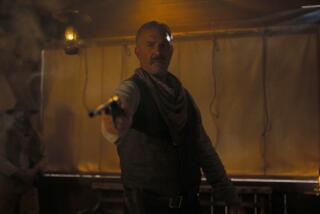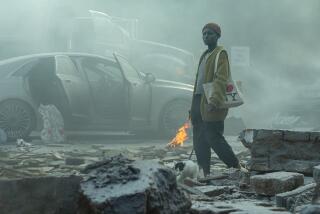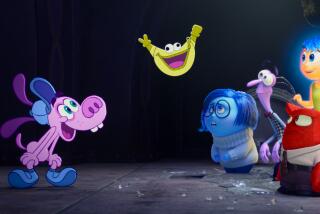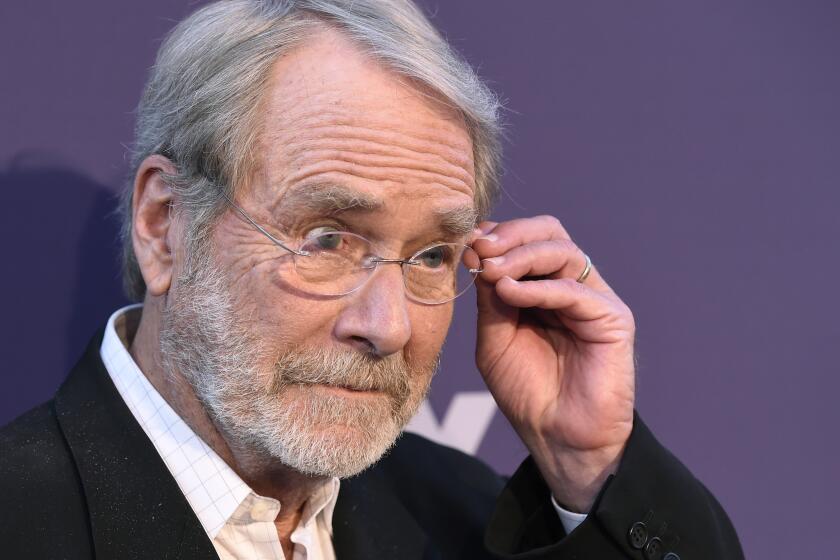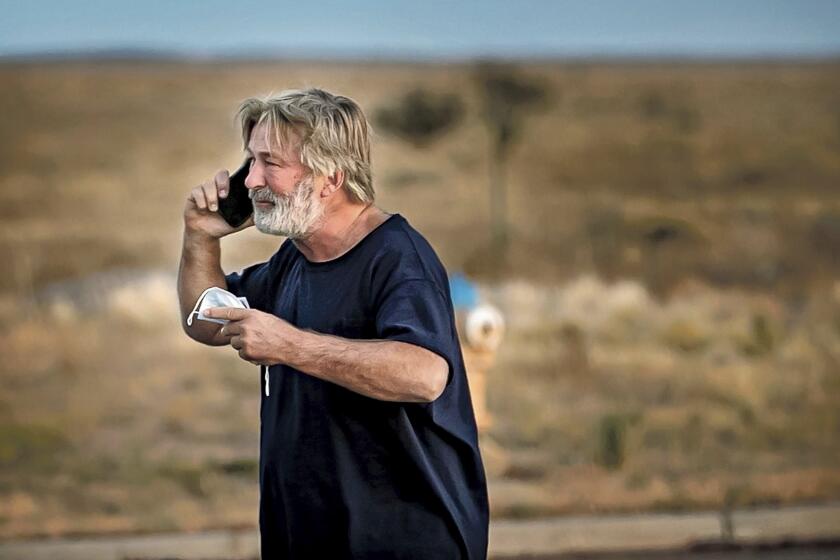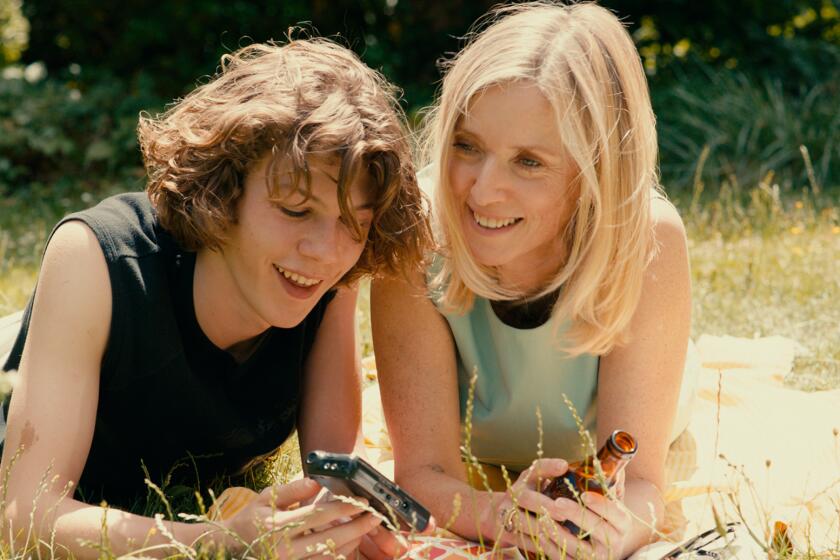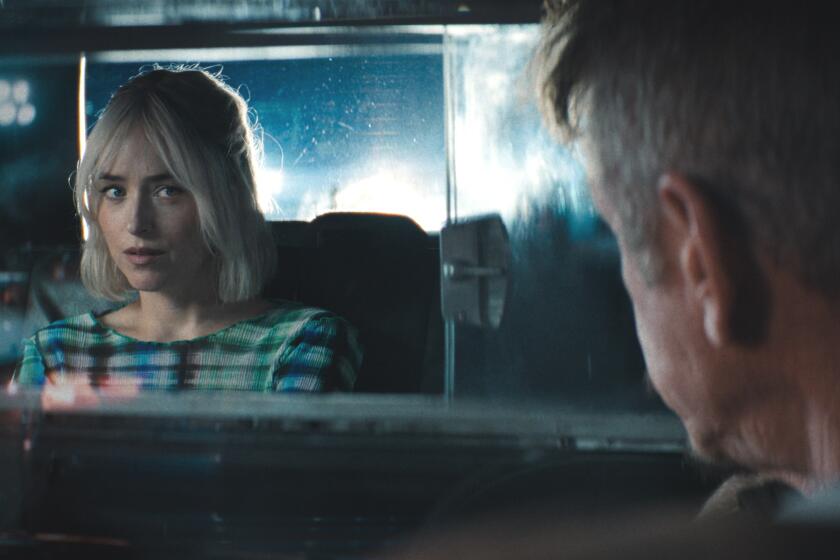Rated ‘R’--as in Ridicule
The plot of the new “South Park” movie seems torn from today’s headlines: Young kids sneak into an R-rated movie and become so entranced by the four-letter words they hear on screen that they can’t stop using them. Their parents and eventually the government are so outraged that they take drastic action--everything from implanting a V-chip in a child to declaring war.
It’s an exaggeration of recent events, of course, but clearly the R-rated “South Park: Bigger, Longer and Uncut” is a case of art imitating--or at least satirizing--life in ways that have already brought controversy to the raunchy comedy based on the popular Comedy Central TV series.
The animated musical, which opens Wednesday, makes the Motion Picture Assn. of America’s rating system an object of ridicule. The “South Park” kids make repeated and vivid use of explicit language--in fact several of its songs are built around words not uttered in polite society. But that’s relatively mild compared to the feelings “South Park’s” creators, Trey Parker and Matt Stone, have toward the MPAA.
“They [the MPAA] have no set rules. Things change from movie to movie,” says Stone. “It makes no sense. . . . In going through their notes we saw that they had no standards so we decided these people are stupid and we’d just try to get it past them. If there was something they said couldn’t stay in the movie, we’d make it 10 times worse and five times as long. And they’d come back and say, ‘OK, that’s better.’ ”
Stone believes the MPAA was more lenient toward “South Park” because of pressure applied by Paramount, which is releasing it. Both the studio and the MPAA vehemently deny that assertion.
MPAA head Jack Valenti labels Stone’s comments “an obscene lie. I don’t allow member companies to lean on the rating system.”
“South Park” arrives at a worrisome time for Hollywood, when Washington’s latest finger-pointing at the industry for depictions of violence and sex, and marketing adult films to teens is at its peak. An understandably nervous Paramount finds its film being an involuntary test-case for theater owners’ recent voluntary pledge to ask for photo identification when selling tickets to R-rated films. In the next few weeks, two R-rated movies with sexual content, the teen comedy “American Pie” and Stanley Kubrick’s “Eyes Wide Shut,” will open, bringing further scrutiny to the theater owners’ new policing policy.
Despite its cast of 8-year-old characters, “South Park” is “most definitely a film for adults,” says Paul Dergarabedian, head of Exhibitor Relations, an industry tracking firm. “But it had strong kid appeal. The whole ID idea is a new thing and it’s going to have the inevitable growing pains. Kids will slip through the cracks.”
“Exhibitors must be in a quandary,” says one competing studio executive. “I wouldn’t want to be the poor theater manager after some parents come out of the screening.”
The self-referential plot of “South Park” directly confronts these questions. For example, after sneaking into the R movie, the South Park brigade wears T-shirts from the offensive movie in class--a sly reference to real complaints stemming from kids wearing “South Park” T-shirts to school.
Outraged parents take matters into their own hands, which escalates to a declaration of war on Canada, where the R-rated film-within-the-film was produced. Although it seems incredibly up to date--including references to the Jar Jar Binks character from the new “Star Wars” film--Parker and Stone say they decided on this plot for the movie well over a year ago.
“We know intimately what some of the reactions to ‘South Park’ [the TV show] have been,” says Stone. “We decided that if we were going to skewer zealots and moral watchdogs, we didn’t want to be self-righteous, so we took a few jabs at ourselves.”
The R rating for the film calls into question the MPAA’s criteria--which again was intentional. Besides the film’s widespread use of curse words, it contains something to offend nearly everyone, including crude treatment of celebrities ranging from Bill Gates to the Baldwin brothers. Having insisted on an R rating in their contract with Paramount (which originally asked for a PG-13 movie), Parker and Stone left it to the studio to deal with the MPAA.
“We got an R because Paramount was behind it,” says Parker. “But the independent filmmaker gets screwed.”
“That’s not true,” counters Paramount senior executive Rob Friedman, who was involved in the ratings arbitration process with the MPAA. “Anybody who submits their movies for a rating, whether they’re an independent or a studio, falls under the same guidelines.”
An obviously outraged Valenti of the MPAA noted: “We’ve been in business for 30 years and while there have been occasional errors in judgment, there has never been any evidence of malfeasance or bending to pressure. The ratings board is immune from that pressure. If they have some evidence of this, I’ll fire whoever’s responsible.”
Parker and Stone have crossed swords with the ratings organization before, losing their battle on the independently made film “Orgazmo,” which received an NC-17 rating, they say, despite the fact that they consider it to be mild by comparison to “South Park.” “The reason we got the NC-17 on ‘Orgazmo’ was that it was released by October Films, which had no clout, and we didn’t have the money to reedit the film and continue to resubmit it,” says Parker.
“It’s all politics, relationships at the top,” says Stone. “It’s who you know. If you’re Steven Spielberg and you want to push those limits, like in ‘Saving Private Ryan,’ you can because it’s done in the name of high art and how much money he makes [for the industry].”
The satirical skewering in the film obliterates any line of political correctness. Though the $20-million film began production several months ago, changes and inserts were made until a week ago. The script for the 83-minute film went through about 40 drafts.
“Paramount was freaking out because we were adding things a week ago,” says Parker. “We don’t finish the TV shows sometimes until a day before they air.”
Since the film takes several racial, ethnic and gender swipes, Parker and Stone couldn’t resist what they saw as the racist implications of “Phantom Menace’s” Jar Jar Binks character. “We just had to one-up George Lucas,” Parker laughs. At the same time, Stone says they were nervous about the satirical use of blacks as human shields in the film’s war sequences, in light of the real use of citizens as human shields in the recent Kosovo conflict. But they decided not to censor themselves.
“If it exists, we make fun of it,” says Stone. Adds Parker: “There isn’t a place we won’t go. As soon as you say we can’t make fun of this, we know we have to. . . . Society needs to realize it’s comedy. Laughing at something doesn’t mean we don’t care about it. A racist joke is not an endorsement of racism.”
As fans of the TV series are aware, real-life celebrities are often the target of Parker’s and Stone’s pillorying, and the credits of the film mention that the famous people are depicted without their permission. However, there are certain legal guidelines set forth by the lawyers at Paramount and Comedy Central, says Parker. For example, one of the biggest laughs in the film comes when Microsoft’s Bill Gates gets shot--a scene which was legally approved. “You can kill him. But you can’t say that Bill Gates must die,” Parker explains.
Even fans of the Comedy Central series, which just began a new season two weeks ago, may not be prepared for some of the film’s more scabrous elements, especially in light of the magnifying glass the entertainment industry is under in regard to content.
“We’ve only seen it with one audience, at the premiere [last week],” says Stone. “Some people were offended. But I don’t think the 70% or 80% who loved it would have loved it as much if the 20% weren’t pissed off.”
Parker and Stone say they’ll react to any outcry against the movie in the same way they reacted to initial protests against the TV show. “We’ll do now what we did then: ignore it and do our work,” says Parker. “Let Paramount deal with it.”
Friedman asserts that Paramount has done its job in laying the groundwork for parents to make a sound assessment. “We clearly state that the film is R-rated in all our materials,” says Friedman. “It’s a widely watched TV show, predominantly by adults. I believe anyone who is aware of ‘South Park’ knows that it’s sophisticated humor. We’ve gone out of our way to stress that.”
The filmmakers doubt that the theater owners’ new enforcement policies will prevent determined kids from getting in to see the movie--much as the “South Park” kids do in their own movie, thanks to a homeless man who buys them tickets. “I think ‘Wild Wild West’ [which is rated PG-13] is going to sell a lot of tickets next week,” Parker says with a laugh.
“I remember being 13 or 14 and buying tickets to one movie and sneaking into a ‘Monty Python’ film or ‘Stripes.’ But they didn’t make me want to go out and kill people. There are worse things for kids to see.”
Not that Parker disagrees with the rating. “The R rating is perfect. Kids shouldn’t see this on their own. If their parents think it’s OK to take them, that’s their decision.”
More to Read
Only good movies
Get the Indie Focus newsletter, Mark Olsen's weekly guide to the world of cinema.
You may occasionally receive promotional content from the Los Angeles Times.
